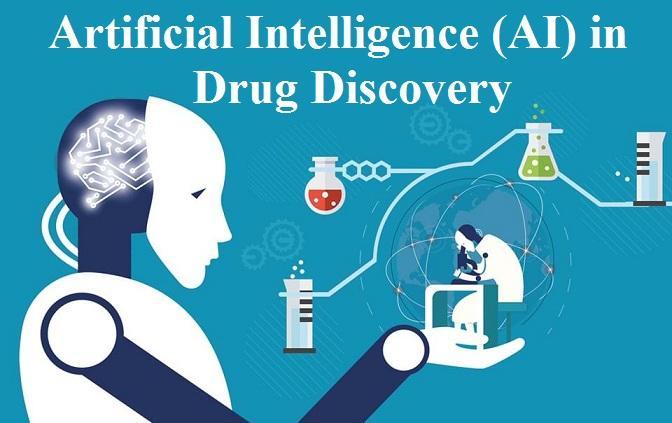Artificial Intelligence (AI) in Drug Discovery Market Overview:
The global Artificial Intelligence (AI) in drug discovery market is projected to grow at a rate of 25-30% over the next five years. Key factors driving this growth include the increasing need to lower drug development costs and timelines, the rising adoption of AI technologies within the healthcare and life sciences sectors, the growing volume of data generated in life sciences, advancements in computing power, and the expanding collaborations between pharmaceutical companies and AI firms. Additionally, the approaching patent cliff, the potential of generative AI models in innovative drug design, and the rising demand for personalized medicine are all contributing to the market’s momentum. However, challenges such as high implementation costs, concerns over data privacy and security, the lack of quality and standardized data, and regulatory and ethical hurdles could pose barriers to continued growth
Strategic Insights Made Affordable — Limited Period Year-End Offers Now Live.
Competitive Landscape Analysis
The global AI in drug discovery market is highly competitive, with several key players making significant contributions to the industry. Some of the major companies in the market include:
- Atomwise Inc.
- BenchSci
- BenevolentAI
- BPGbio, Inc.
- Deep Genomics
- Exscientia
- Iktos
- Illumina, Inc.
- IBM Corporation
- Insilico Medicine
- Insitro
- Microsoft Corporation
- Nvidia Corporation
- Numedii, Inc.
- Recursion
- Schrödinger, Inc.
- Tempus Labs
- Valo Health
- Verge Genomics
- Xtalpi Inc.
Artificial Intelligence (AI) in Drug Discovery: Enhancing Efficiency and Reducing Costs
AI in drug discovery refers to the use of advanced computational techniques to improve the speed, accuracy, and efficiency of identifying and developing new medications. By leveraging machine learning (ML) and deep learning (DL) technologies, AI can analyze large chemical spaces, predict molecular properties, optimize drug designs, and even repurpose existing drugs for new uses. This integration of AI significantly accelerates the drug development process, lowers costs, and improves the likelihood of successfully bringing new therapies to market.
The Growing Demand to Cut Drug Development Costs and Time
The increasing need to reduce the cost and time associated with drug development is a primary driver behind the growing adoption of AI in the pharmaceutical industry. Traditional drug discovery is notoriously slow and expensive. It can cost upwards of $2.5 billion to develop a new drug, factoring in the high failure rate. Scientific and technical challenges contribute to a low probability of success, with only about 35% of drug candidates making it past early-stage development and into clinical trials. Even more concerning is that only 9-14% of drugs make it from Phase 1 trials to regulatory approval. The entire process typically takes 12 to 15 years.
AI is addressing these challenges by streamlining the drug development process. For example, AI algorithms can analyze massive datasets, predict which compounds might make effective drugs, and optimize the chemical properties of potential candidates. This significantly shortens the time spent on early-stage research, lowering research costs. AI-powered virtual screening is also reducing lead times in drug discovery. As a result, pharmaceutical companies are increasingly relying on AI to drive efficiency, cut costs, and speed up development timelines in a highly competitive market.
“The attrition rate during clinical trials is approximately 90%, meaning that only a small fraction of drugs that enter clinical development ultimately receive approval. This high failure rate contributes significantly to the overall costs of drug development.”
– Associate Director, Leading AI in Drug Discovery Company, United States
Download Sample Copy: https://meditechinsights.com/artificial-intelligence-in-drug-discovery-market/request-sample/
Advancements in Computing Power Driving Market Expansion
Significant advancements in computing power are fueling the growth of AI in drug discovery. The rise of high-performance computing (HPC), along with powerful graphics processing units (GPUs) and tensor processing units (TPUs), has made it possible for AI algorithms to process enormous datasets, conduct complex simulations, and model biological systems with greater efficiency. These capabilities allow researchers to simulate drug interactions, predict molecular behavior, and identify promising drug candidates faster than traditional methods. As a result, the overall timeline and cost of drug development are being reduced.
Machine learning models, supported by advanced computing technologies, can analyze vast genomic, proteomic, and chemical datasets, uncovering novel insights that might be missed by conventional approaches. Additionally, the integration of quantum computing is poised to further revolutionize the field by enabling more accurate simulations of molecular interactions. These innovations are also helping drive the development of personalized medicine, where AI can help tailor treatments to a patient’s unique genetic profile. As computing power continues to improve, AI systems will become even more effective, attracting further investment and accelerating innovation in drug discovery. This ongoing progress is expected to drive market growth and lead to more effective, affordable therapeutics.
Growing Trend of Collaborations Between Pharma and AI Companies
The AI-driven drug discovery market is experiencing rapid expansion, largely due to the increasing number of collaborations between pharmaceutical companies and AI-focused firms. Traditional drug development is notoriously expensive and time-consuming, prompting pharmaceutical companies to seek more efficient and cost-effective solutions. AI companies bring advanced algorithms, machine learning models, and data analytics tools to the table, enabling the optimization of various stages of drug discovery—from target identification to clinical trials. By partnering with AI firms, pharmaceutical companies can leverage expertise in handling massive datasets, including genomic, proteomic, and clinical data, to make more accurate predictions about a drug’s effectiveness, toxicity, and potential side effects.
For AI companies, these partnerships provide access to valuable pharmaceutical data, research funding, and real-world opportunities to apply their technologies. Together, these collaborations have resulted in successful outcomes, such as the discovery of new drug candidates, drug repurposing efforts, and optimized clinical trial designs. As a result, strategic partnerships, joint ventures, and licensing agreements between pharma and AI companies are becoming increasingly common, further fueling market growth. This trend is expected to continue as both industries recognize the mutual benefits, driving innovation and accelerating the drug discovery process. The ultimate result will be faster, more effective therapeutics reaching the market.
North America: A Key Driver of AI in Drug Discovery Market Growth
North America is expected to be a major growth engine for the AI in drug discovery market, driven by several key factors. The region is home to a strong pharmaceutical industry, with leading companies heavily investing in AI to streamline drug development and reduce costs. In addition to a highly developed healthcare infrastructure, North America boasts an abundance of research institutions and significant funding from both government and private sectors, which collectively facilitate the adoption of AI technologies in drug discovery.
The region is also a hotbed for AI and biotechnology startups, many of which are collaborating with pharmaceutical giants to create AI-driven solutions. Supportive regulatory frameworks, such as the US FDA’s initiatives for AI in healthcare, foster an environment conducive to innovation and faster drug development. The large volume of healthcare data generated in North America, combined with advancements in data analytics and computing power, makes the region an ideal location for AI applications in drug discovery. With these combined factors, North America is expected to drive market growth, attracting investments and pioneering new AI-powered drug discovery techniques.
Growth in APAC Driven by Expanding Pharmaceutical Industry and Government Support
The Asia-Pacific (APAC) region is also seeing significant growth in AI in drug discovery, fueled by an expanding pharmaceutical industry, increased investments in healthcare infrastructure, and a growing emphasis on precision medicine. Government initiatives promoting AI research and development, coupled with the rising prevalence of chronic diseases, are contributing to greater demand for innovative drug discovery methods. These factors position APAC as a key player in the global market, with the potential for AI-driven solutions to revolutionize the drug discovery landscape.
Offering Type Segment Analysis
The AI in drug discovery market is divided into two main offering types: Software and Services. The software segment holds the largest market share, driven by the increasing adoption of AI-powered software platforms for tasks such as data analysis, drug design, target identification, and predictive modeling. These AI software solutions enhance the drug discovery process by improving accuracy, accelerating timelines, and reducing costs. On the other hand, the services segment is the fastest-growing area of the market. This growth is primarily fueled by the rising demand for AI-related services, including consulting, integration, and ongoing support. As pharmaceutical companies and research institutions seek customized AI solutions, they require specialized services to implement, manage, and optimize these technologies effectively. Additionally, the complexity of deploying AI software and the need for continual maintenance contribute to the rapid expansion of the services segment.
Application Type Segment Analysis
The AI in drug discovery market is also categorized by application types, including Oncology, Infectious Diseases, Neurology, Metabolic Diseases, Cardiovascular Diseases, Immunology, and others. Oncology is the largest and most prominent segment. The high prevalence of cancer and the complexity of developing effective treatments drive the widespread adoption of AI in cancer drug discovery. AI helps in identifying novel drug candidates, understanding disease mechanisms, and improving precision medicine approaches. The large volumes of data generated in cancer research also necessitate AI tools to manage and analyze information efficiently.
The infectious diseases segment is expected to experience significant growth in the coming years. The global focus on combating infectious diseases, especially following the COVID-19 pandemic, has led to an increased demand for AI-driven solutions. AI’s ability to rapidly identify drug targets, predict disease spread, and support vaccine development has made it invaluable in this field. Moreover, the need for fast and cost-effective drug discovery for emerging pathogens continues to drive the growth of the infectious diseases segment.
Growth Strategies Adopted by Market Players
Companies operating in the AI in drug discovery space are employing both organic and inorganic growth strategies to strengthen their market position. These strategies include collaborations, acquisitions, and new product launches. Some key examples of these strategies include:
- July 2024: Exscientia launched an AI-powered drug discovery platform in collaboration with Amazon Web Services (AWS). This platform integrates generative AI with robotic lab automation, aiming to accelerate drug development while reducing costs. The solution optimizes drug design, synthesis, and testing to deliver high-quality drug candidates more efficiently.
- May 2024: Google DeepMind launched AlphaFold 3, an AI model designed to enhance drug discovery by predicting the behavior of all molecules, including human DNA. The new version of AlphaFold aims to cut development time and costs, providing a free online server to assist researchers with complex biological testing.
- May 2024: Sanofi partnered with Formation Bio and OpenAI to leverage AI technologies for faster drug development. This collaboration combines Sanofi’s extensive data with OpenAI’s AI expertise to streamline the drug development lifecycle.
- February 2024: Almirall partnered with Microsoft to accelerate dermatology drug discovery using AI and advanced analytics. This three-year partnership focuses on leveraging generative AI and data management to develop innovative treatments and drive Almirall’s digital transformation.
- September 2023: Merck entered into a strategic collaboration with BenevolentAI and Exscientia to use AI-driven drug discovery in oncology, neurology, and immunology. These partnerships aim to accelerate the development of novel clinical candidates and improve Merck’s R&D pipeline.
As these examples demonstrate, AI companies and pharmaceutical firms are increasingly joining forces to push the boundaries of drug discovery. The combination of technological innovation, strategic partnerships, and investment in R&D is expected to drive the market’s continued expansion.
Browse Full Report: https://meditechinsights.com/artificial-intelligence-in-drug-discovery-market/
About Medi-Tech Insights;
Medi-Tech Insights is a healthcare-focused business research & insights firm. Our clients include Fortune 500 companies, blue-chip investors & hyper-growth start-ups. We have completed 100+ projects in Digital Health, Healthcare IT, Medical Technology, Medical Devices & Pharma Services in the areas of market assessments, due diligence, competitive intelligence, market sizing and forecasting, pricing analysis & go-to-market strategy. Our methodology includes rigorous secondary research combined with deep-dive interviews with industry-leading CXO, VPs, and key demand/supply side decision-makers.
Contact:
Ruta Halde
Associate, Medi-Tech Insights
+32 498 86 80 79

